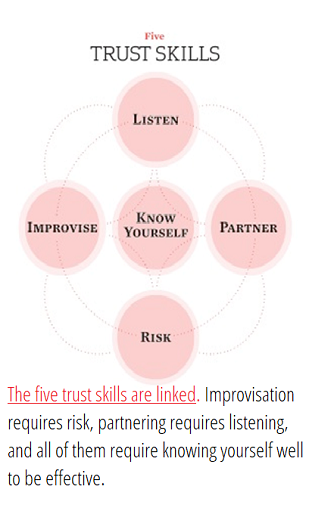This post is part of our Weekly Tips series.

A competency model won’t answer the mail when it comes to building trustworthiness—in fact, there’s risk in attempting to reduce trust to a series of behavioral definitions. At the same time, there is value in culling down the essential skills of a trusted advisor to a practical number. Charlie Green and I specifically identified five in The Trusted Advisor Fieldbook. Heads up: each skill is at risk of being easily dismissed as too basic to merit your attention. Don’t be fooled.
- Listen. You know the importance of listening—so much so that you’re about to drop this article and move onto something else. Not so fast. I’m willing to bet you vastly overrate your listening skills (we see it all the time in our workshops).
The kind of listening that’s typically taught and practiced in the business world is listening with a purpose, and usually that purpose is self-oriented: to sell, to convince, to get smarter, to buy time. By contrast, the kind of listening that engenders deep trust focuses on the act of listening itself.
Be honest—do you regularly listen without an agenda? Do you pass the empathy mastery test?
- Improvise. The business world is rife with the unexpected, including tricky situations and other uncomfortable and awkward moments that occur at the worst possible time. Let’s call these moments of truth. And in these moments, the skill of improvising—inventing, composing, or performing with little or no preparation—is precisely what you need.
Prepare well, for sure. Then realize that your true character gets revealed when you have to be fully present in the face of the unforeseen. And yes, it is possible to practice being good at improvising.
How much risk are you willing to regularly take … for real?
[Tweet “These five essential skills are to a #trustedadvisor what scales are to a maestro: #getreal #buildtrust”]
- Risk. There is no trust without risk, yet most of us shy away from opportunities to do risky things—like speaking a hard truth or sharing something personal—because we don’t think we have enough trust in the relationship for that risk to be tolerated. The irony is it’s the very act of taking those risks that creates trust.
- Partner. Look up the word “partner” in the dictionary and you’ll see “either of two persons dancing together” in the definition. The dancing metaphor is perfect for trust-based relationships. It conjures up images of give and take, synchronization, graceful movement, and being in tune and in step with one another.
How strong a partner are you, really? Do you focus on making others look good, even if it means they look better than you? Are you equally adept at leading as well as following?
- Know Yourself. Introspection is the hallmark of a trusted advisor. The more self-aware you are, the lower your self-orientation tends to be. To know yourself is to have a full and complete inventory of your weaknesses, triggers, and hot buttons, as well as your strengths, interests, and sources of passion and purpose. With this in hand, then you’re well-positioned to manage yourself well. Without this kind of personal mastery, mediocre relationships prevail, and exceptional relationships are elusive.
Have you truly done your homework in this regard? Do you keep doing it, as you keep evolving?
The five essential skills are to a trusted advisor what scales are to a maestro. They’re capabilities you can and should practice, over and over again.
They’re also inextricably linked. Improvisation requires risk, partnering requires listening, and all of them require knowing yourself well to be effective. So, unfortunately you can’t just master two or three; you’ve got to nail them all.
Make It Real
This week, pick one skill a day to attend to. Ask your colleagues or clients for feedback on your strengths and weaknesses. What do you learn about yourself?
Learn More

Read more about the downsides of competency models when it comes to trust building, from our friends at Trusted Advisor Associates, or dig deeper into the five trust skills in Chapter 5 of The Trusted Advisor Fieldbook.
Andrea Howe
Latest posts by Andrea Howe (see all)
- A lesson from my own trust “fail” in my first-ever client meeting - April 15, 2024
- Why choosing silence in the face of awkwardness can be a trust tragedy - March 21, 2024
- What NOT to do when you think you’re being ghosted - February 21, 2024
